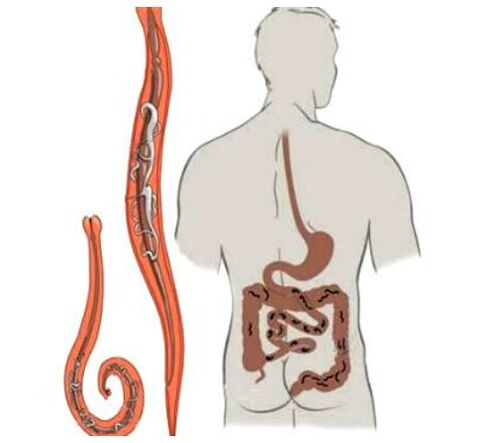The human body is the ideal environment for pathogenic microorganism habitats, which can affect almost any organ or system, leading to many diseases and diseases. In such organisms, there is a special location where these parasites survive and eat with the "owner" of the cells and other nutrients of the body. According to medical indicators, about 90% of people of different age categories are carriers of parasites, and their treatment and research are involved in the Medicine-Parasites section. The term "parasitic" refers to organisms with different types of them that have the ability (settled in the human body) to be introduced in internal organs, food cells, juices or tissues that digest food. Foreign creatures can penetrate any part of our body and live in it for a long time or throughout the life of our person. Certain types of parasites in the human body do not cause special changes, but some people can negatively affect the "host" wellbore and lead to the development of certain serious diseases. In this case, we are talking about parasitic diseases that require immediate treatment. In medicine, parasites are called any pathogenic organism that leads the human parasitic lifestyle. These include a variety of bacteria, viruses, fungi, as well as worms, simple, single-cell, arthropods, protozoa invasions and other species.
What is a parasitic disease?

Parasitic diseases (invasion) are a large number of diseases caused by a variety of pathogenic organisms that survive and reproduce in the human body. There are about 300 types of parasites that affect the human body. Parasitic diseases can be caused by pathogenic bacteria and parasitic protozoa, arthropods, single cells, and other parasites or viruses. The list of parasites in the human body is very large, but regardless of type, almost all toxins release toxins that destroy cellular structures, damage internal organs, penetrate lymphatic flow, blood, poison the body and destroy the work of internal organs and systems.
Basically, disease-causing organisms consume nutrients a person receives with food. Perhaps this behavior of "uninvited guests" explains that many people live the right lifestyle, monitor their health and food without getting the ideal result, because these "Darmists" will do their best, leaving only one person's useful substance. These creatures are so cunning that they are often disguised as other diseases and that a person can walk around the doctor for years without noting the positive outcome of the treatment.
How do parasites fall into the human body?
Foreign organisms can penetrate the human body in a number of ways, but the most common infection is through:
- Water or soil infected by worms.
- Foods that have not yet passed the required processing: fried meat, fish, dirty vegetables, fruits, dairy products.
- Contact with domestic animals or homeless animals.
- Insect bites.
- Not compliant with personal hygiene rules.
- In close contact with the carrier of the parasite.
Many parasites that live in the human body do not have tension, cardiovascular or respiratory system, but their reproductive organs are able to throw hundreds of thousands of mature, mature eggs into the environment. The parasite's eggs and larvae are stable and they can be in soil, water, food or personal items for a long time. For example, tape eggs can withstand minus 15 degrees and maintain their vital activity for 9 months. Almost all parasites have this protection mechanism that cannot be identified and destroyed the human body. This is why many parasitic diseases are difficult to diagnose. Pathogenic organisms can be found in the intestine and lungs, blood, liver, joints, brain and even eyes. The location of pathogenic organisms depends on their type and other characteristics, both in a person and in the parasite themselves.
Parasites living in the body distinguish the substances that helped them live for many years. They do not have a digestive system, however, parasites use only beneficial substances that enter the body, which allows them to survive for many years while a person slowly loses health and does not doubt the real reason.
To adapt to new conditions, special organisms use their "equipment": pointed hooks, plates, plates, hard hair, sucking cups, mucous membranes that constantly damage the organs. Parasites themselves can have a length of several millimeters to several meters, and they also have various toxins that secrete various toxins that not only cause diseases in the work of internal organs, but also inhibit immunity, destroy the beneficial bacteria of the gastrointestinal tract, and exert excessive crises with the liver.
Signs and symptoms of in vivo parasites

Parasites in the body - The symptoms they exist may not exist or are similar to the clinical manifestations of other diseases. For example, larvae in the lungs can cause symptoms of pneumonia, pinworms - attacks from appendicitis and parasites - attacks from bile tracts or pancreatitis.
In addition, parasitic diseases can cause frequent colds, sore throats, bronchitis and other diseases. You can suspect that the presence of parasites in the human body is based on the following symptoms:
- Diseases in gastrointestinal tract work: diarrhea, flatulence, frequent constipation, irritable bowel syndrome
- Joint and muscle pain
- Allergic skin reactions
- Anemia: Many "cohabitants" feed on blood, which leads to the development of iron deficiency anemia
- Lose or increase weight
- Violation in spiritual work. Toxins that distinguish parasites have a destructive effect on the nervous system, causing a person to increase irritability, neuroticism, frequent depression, panic attacks and other diseases
- Brooksism - The teeth in the dream rattle
- Intestinal malnutrition
- Invasion in the work of the immune system. Many worms and parasites reduce the production of immunoglobulin A, and over time, their immunity decreases. A person has no defense ability before viruses and infectious diseases
- Respiratory inflammation process
- Tumor disease. Long-term discovery of in vivo parasites can lead to a significant reduction in immunity and degenerate epithelial cells into cancer
In addition to the above symptoms, parasite invasions often damage the liver, kidneys, and cardiovascular systems, which can lead to the development of many diseases that are difficult to treat. It is important to note that none of the above signs of parasites in the human body are accurate confirmation of their existence. Only professional and high-quality diagnosis can help determine the existence or absence of "uninvited guests".
How to identify parasite diseases
Diagnosing the presence of worms is very difficult, especially immediately after infection. Until recently, the only way to identify "strangers" was the duodenal sound and analysis of feces. The results of such studies allow the identification of fragments, larvae or eggs of the parasite. However, this approach does not always give reliable results. Currently, modern technology is used to detect parasites, which allows you to identify nearly any parasite.
- Calais analysis (perform at least 3 times)
- Immunotype Analysis (ELISA)
- ELISA Test
- Serological research methods
- Ultrasound examination of visceral (ultrasound)
- Computed tomography
- PCR diagnostics provide parasite analysis based on DNA analysis
The findings can not only determine the presence of in vivo parasites, but also evaluate the condition of internal organs to identify other diseases or diseases.
Treatment of parasitic diseases
The treatment of parasitic diseases depends on many factors: specific types, their size, number, patient age, weight, and other characteristics. The drug market offers a large number of drugs targeting parasites, but not all drugs can overcome specific parasites. It is important to note that almost all parasites violate the work of internal organs and therefore a comprehensive treatment should be prescribed for patients, which is designed not only to destroy the invasion, but also to restore the damaged internal body.
In addition to synthetic drugs targeting antibiotics for worms, antiparasitics containing natural ingredients are also used to treat parasites. There are no contraindications for such funds, and the human body has a good tolerance.
Only doctors should treat parasitic diseases after the study results and the identification of pathogenic organisms. The treatment process, dose and name of each patient are prescribed separately. All antiparasitic drugs have a lot of contraindications and side effects, so you need to consult before use.
In the treatment of parasites, it is important to use drugs that restore gastrointestinal tract, liver, and kidney functions, which help stimulate immunity and provide the body with vitamin preparations. No less than the main factor in treating parasitic diseases is considered appropriate nutrition. Patients need to rule out their meat and dairy diets because they are an ideal environment for parasite transmission. The use of sugar and candy must also be completely excluded. Nutrition should be balanced, high-quality and useful to the human body.
The prognosis after treatment of parasitic diseases is basically advantageous, but in the case of large, large parasites of large size in the body or major damage to internal organs, it is difficult to predict the results after treatment.
Prevent parasitic diseases

You can protect yourself from parasite penetration, but only if you observe simple rules. A person's internal prevention of parasites is:
- Comply with personal hygiene rules
- Lack of contact with homeless animals
- Avoid children who are close to their pets
- Play with your kids on the street to make sure he doesn't choose a variety of items
- Be sure to wash your hands after playing in the sandbox
- During the walk, don't eat on the street, only wash them
- Clean your house regularly
- Use only washed and treated vegetables, fruits
- Eat only good meat
- Drink only boiling water
- If any animal needs to be done once every 6 months in the house to prevent parasitic diseases.
Complying with simple prevention rules will allow the prevention of parasite infections, thereby protecting yourself and your family from possible diseases in the work of internal organs, which often manifest in the context of parasite diseases.

















































